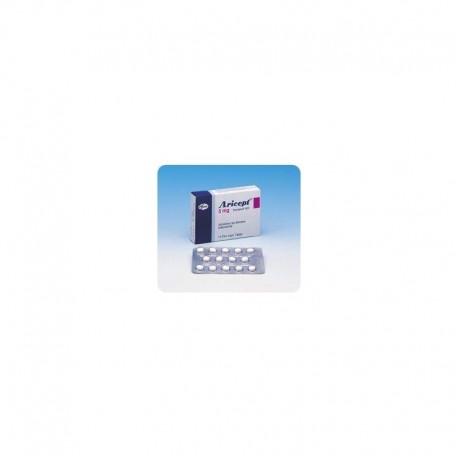 View larger
View larger Aricept (donepezil) 28 Tablets
New product
| Quantity | Discount | You Save |
|---|---|---|
| 2 | 5% | Up to $3.40 |
| 3 | 10% | Up to $10.20 |
| 4 | 15% | Up to $20.40 |
| 5 | 20% | Up to $34.00 |
Aricept Tablets ingredient donepezil
Volume discounts
| Quantity | Discount | You Save |
|---|---|---|
| 2 | 5% | Up to $3.40 |
| 3 | 10% | Up to $10.20 |
| 4 | 15% | Up to $20.40 |
| 5 | 20% | Up to $34.00 |
More info
ARICEPT film-coated tablet
It is taken orally.
Active ingredient
It contains donepezil hydrochloride equivalent to donepezil base.
Excipients
Lactose, corn starch, microcrystalline cellulose, hydroxypropyl cellulose, magnesium stearate, hydroxypropylmethyl cellulose, talc, polyethylene glycol 8000, titanium dioxide E171, yellow iron oxide E172.
What is ARICEPT and what is it used for?
ARICEPT (Donepezil hydrochloride) 10 mg film-coated tablets are yellow in color, round and convex on both sides. . It says 'ARICEPT' on one side and '10' on the other. Each tablet contains 10 mg donepezil hydrochloride and is presented in packages of 28 tablets. ARICEPT tablet is used in the treatment of mild to moderate Alzheimer's type dementia symptoms and its active ingredient donepezil hydrochloride belongs to a class of drugs called acetylcholinesterase inhibitors. ARICEPT is used only in adult patients.
How to use ARICEPT?
Instructions for proper use and dose/frequency of administration
- Take the ARICEPT tablet before going to bed at night.
- Generally, treatment is started with one tablet (5 mg donepezil hydrochloride) per day. The amount of medication you will use may vary depending on the duration of treatment and your doctor's evaluation.
- One month after starting the treatment, your doctor may want you to increase the dose of the drug and take one tablet (10 mg donepezil hydrochloride) a day from the commercially available ARICEPT 10 mg tablets.
- The highest recommended dose is one 10 mg ARICEPT every night
- Always follow the recommendations of your doctor and pharmacist about when, how and for how long to use your medicine.
- Do not change the dose of your medicine yourself unless your doctor recommends it.
- Do not stop the treatment unless informed by your doctor.
- You may need to visit your doctor from time to time to review your treatment and evaluate your symptoms.
Application route and method
- Swallow ARICEPT by mouth with a glass of water before going to bed at night.
different age groups
Use in children
Use in the elderly
Use in the elderly
Mean plasma concentrations monitored in elderly patients with Alzheimer's during treatment were comparable to those seen in young healthy volunteers.
Special use cases
- Renal impairment: Since clearance (removal) of ARICEPT is not affected by these conditions, a similar dosing schedule can be applied in patients with renal impairment.
- Hepatic impairment: Due to possible increased exposure to the drug in mild to moderate hepatic impairment, dose adjustment should be made according to individual response.
If you have the impression that the effect of ARICEPT is too strong or too weak, talk to your doctor or pharmacist.
If you use more ARICEPT than you should
Do not take more than one tablet per day. If you have used more than you should use ARICEPT, inform your doctor immediately. If you cannot contact your doctor, go to the emergency department of the nearest hospital. Take the medicine box with the tablets with you when you go.
If you have used more than you should use from ARICEPT, talk to a doctor or pharmacist.
What are the possible side effects?
Like all medicines, there may be side effects in people who are sensitive to the substances contained in ARICEPT.
The most common side effects with ARICEPT are diarrhea, muscle cramps, weakness, nausea, vomiting and insomnia.
Side effects were defined as shown in the following categories: Very common: may occur in at least 1 in 10 patients.
Common: less than 1 in 10 patients, but more than 1 in 100 patients.
Uncommon: less than 1 in 100 patients, but more than 1 in 1000 patients.
Rare: less than 1 in 1,000 patients, but more than 1 in 10,000 patients.
Very rare: less than 1 in 10,000 patients Not known: Cannot be estimated from the available data
If you notice any of the following, tell your doctor immediately or go to the nearest hospital emergency department:
Rare :
• Liver damage such as hepatitis. Symptoms of hepatitis include feeling or vomiting, loss of appetite, feeling generally unwell, fever, itching, yellowing of the eyes and skin, dark urine
Unusual:
• Stomach or duodenal ulcer. Symptoms of ulcer are stomach pain and a feeling of discomfort (digestion) between the navel and breastbone.
• Gastric or intestinal bleeding. In this case, you may experience effects such as black tar-like stools or blood in the rectum.
• Seizure or contraction (convulsion)
All these are serious side effects. Emergency medical attention may be required. "Serious side effects are very rare".
Tell your doctor if you notice any of the following:
Very commonly reported side effects:
Diarrhea, nausea, headache.

